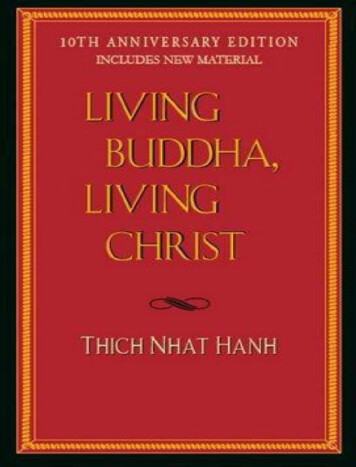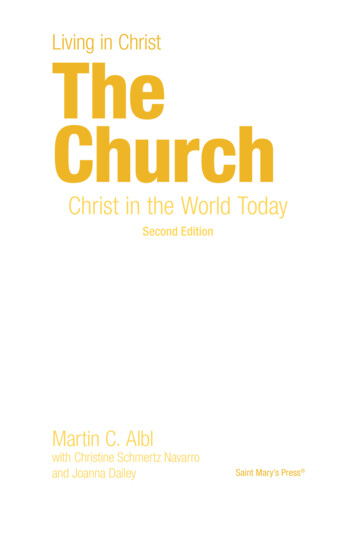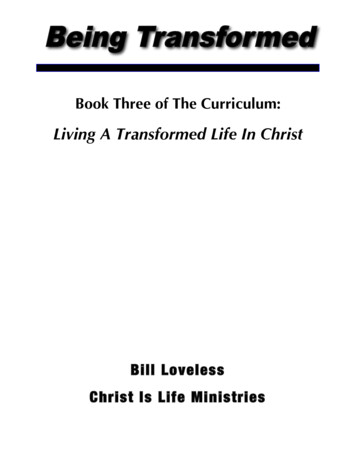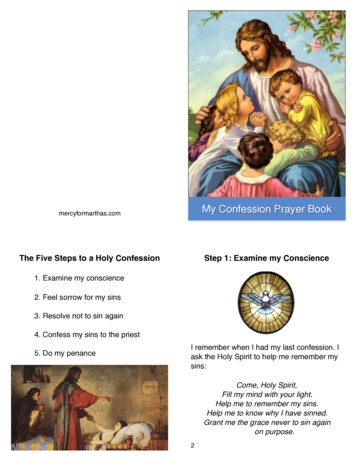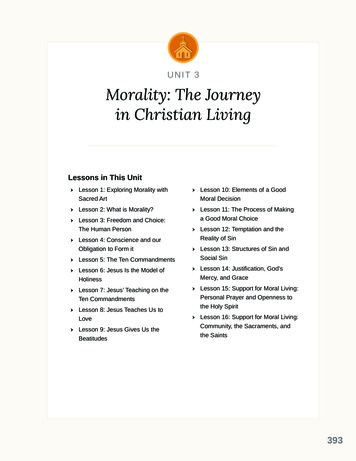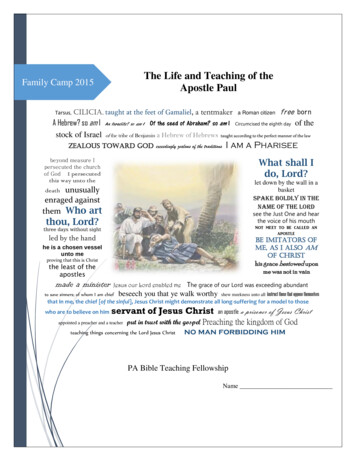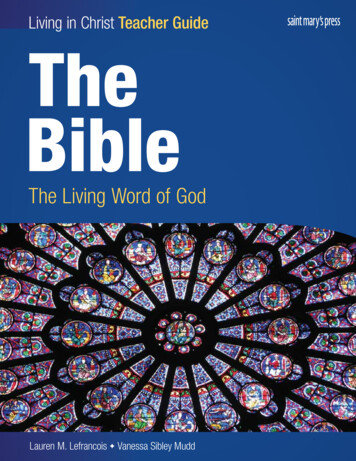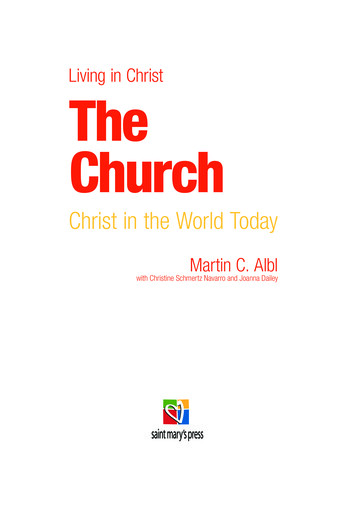
Transcription
1LIVING IN CHRISTJohn EdmistonThis book – Living In Christ is Copyright AIBI-International 2003 – 2010This article may be freely reproduced for non-profit ministry purposes but may not be sold in anyway and must be reproduced “as is” without alteration. Just e-mail us at johned@aibi.ph
2Table of ContentsWalk WorthyThe Basis of Christian UnityThat He Might Fill All ThingsGifts From AboveThe Church: A Living Community of Mature Christlike BelieversThe Church is to be Radically Different from the WorldPutting On the New ManPutting Off the Old ManWalk In LoveSin is Serious StuffLiving in the LightRedeeming the TimeBe Filled with the SpiritOrder in RelationshipsParents and ChildrenSlaves and MasterThe Armor of GodAn Ambassador in Chains35791113151719212325283032343640
3Walk Worthy!I therefore, the prisoner in the Lord, beseech you that you walk worthy of the calling withwhich you are called, (2) with all lowliness and meekness, with long-suffering, forbearing oneanother in love, (3) endeavoring to keep the unity of the Spirit in the bond of peace. (Ephesians 4:1-3)Our series on Ephesians moves from Life In Christ (chapters 1-3) to Living In Christ (chapters 4-6)- and from an emphasis on “being and being in” to an emphasis on “doing and working out”.Having established our place and privilege in Christ - we now find out what a God-indwelt life lookslike in the Church, (chapter 4) in the family and society (chapter 5) and in the Heavenly realms(chapter 6).The connecting verse is Ephesians 4:1 with its injunction to “walk worthy of the calling with whichyou are called,” We have a high calling – how then do we live it out? If God calls us saints andplaces us in the heavenly realms with Christ – how should we then live?Paul does not answer this question in terms of material lifestyle. We are not told that as “God‟skids” we should live in luxury. Walking worthily of the high calling is not a matter of possessionsand gracious living but of obedience and gracious attitudes.Living worthily of our high calling means we will be humble and peaceful: “with all lowliness andmeekness, with long-suffering, forbearing one another in love, endeavoring to keep the unity of theSpirit in the bond of peace.”Let‟s play it in reverse: “With haughtiness and arrogance, with impatience, being easily offended,engaging in faction-fighting at every opportunity, and maintaining carnality and immaturity in anatmosphere of conflict.”Put like this it is obvious what is of the Spirit, and what is of the flesh. (Galatians 5:16-23).Life in the Spirit is NOT characterized by back-biting, gossip and conflict. Rather the life of thesaint is patient and humble, loving and kind, and gives each person space to grow in Christ.Many of the attitudes inculcated into us when we first learn social skills – are of the flesh. Youngadults are often encouraged to be elitist, proud, and haughty. They are taught to jump on minorsocial infractions, to reject others and to separate from others and form cliques. Unfortunatelysome of this sub-standard socialization makes its way into the Church.The Church should not be like the world, and should not be driven by the flesh and by human prideand factionalism. Rather the Church should be a place where saints can be grown.The Church should be forbearing of new Christians, meek and gentle to the hurting, free ofpecking orders and cliques and humble in a real and solid kind of way. Such people are saintlyand saintly people are worthy of their calling.Let‟s look at these spiritual virtues in a bit more depth:Lowliness – the opposite of haughtiness. Without superiority or class distinctions, able to serve,delighting in lifting up another person, never putting someone down. The lowly person surrendersthe best seat. Lowly people lift others up by getting underneath. This is why the Son of God called
4Himself “lowly”:(Matthew 11:29) Take My yoke on you and learn of Me, for I am meek and lowly in heart, and youshall find rest to your souls.Lowliness is commended throughout the Scriptures and is something that God regards and givesgrace to - (Job 22:29, Ps 138:6, Prov. 3:34, 11:2, 16:19; Luke 1:52) and the true apostles werelowly of heart (2 Corinthians 7:6, 10:1) and it is an essential part of the Philippians 2 section onhumility: Let nothing be done through strife or vainglory, but in lowliness of mind let each esteemothers better than themselves (Philippians 2:3).With lowliness there are no pecking orders.Meekness: The opposite of arrogant abusiveness. Meek people are safe and gentle. They displaytrue spiritual greatness, God defends the meek (Ps 76:9, 147:6) and they will inherit the earth(Psalm 37:11, Matthew 5:5). Moses was exceptionally meek (Numbers 12:3) and it is one of thecharacteristics of the triumphant Messiah (Psalm 45:4., Isaiah 11;4, Zech 9:9) and of course Jesuswas meek (Matthew 11:29,) in fact it was one of His kingly virtues at His triumphal entry (Matthew21:5).As the opposite of abusiveness and arrogance - meekness is to characterize NT church-discipline(1 Corinthians 4:21, 2 Corinthians 10:1, Galatians 6:1, 2 Timothy 2:25) and especially the life ofthe Christian teacher, apologist and defender of the faith (2 Timothy 2:25, 1 Peter 3:15, Titus 3:2,James 3:13). It is also part of being a truly godly Christian woman (1 Peter 3:4) and an attentivedisciple (James 1:21).Long-suffering and forbearance: The opposite or irritability and swift judgementalism. The ability toput up with others and give them room to grow – as we ourselves would like others to give usgrace and understanding. These attributes are at the very heart of the glory of God (Exodus34:6,7). Immature people lack them entirely. People who are forever fuming and fretting and beingannoyed, need to grow up in Christ. While we can demand our rights now and then most of thetime we should not be so fussy. Maturity involves “put-up-ability”.Finally, we should have a spirit of cooperation and unity, a good “team spirit”, that is from the HolySpirit, so that we are “forbearing one another in love, endeavoring to keep the unity of the Spirit inthe bond of peace.”Thus walking worthily is thus not about spiritual elitism, fractious legalism, or divisive judging;neither is it about being a superior Christian – it is about being a lowly, meek , patient, loving andcooperative saint. If we are walking worthily we will not over-emphasize denominationaldifferences or divide off from others but endure their faults, pray for them and be meek and lowlytowards them.
5The Basis of Christian UnityThere is one body and one Spirit, even as you are called in one hope of your calling, (5) one Lord,one faith, one baptism, (6) one God and Father of all, who is above all and through all and in you all.(Ephesians 4:4-6)All born-again Christians share a basic existential unity in the Spirit. The foundations of our life inChrist are the same for all - and are invariant through time and culture.Though we may belong to different churches, denominations and organizations we are a part of“one body” the body of Christ.Even though we may express ourselves in a hundred different ways - we are indwelt by the oneHoly Spirit.Even though we may have different tasks - we all have one common hope in the return of the LordJesus Christ and one common calling - to be like Christ.Even though we may have diverse teachers and leaders we only have one Lord – Jesus Christ.Even though we may believe differently about certain non-essential matters there is only one faith– in the crucified, risen, ascended and soon returning Lord Jesus Christ.While our theology may vary, there is only one God that we are trying to describe and know, andHe is the God and Father of us all.And all born-again Christians relate to God in the same three basic ways – He is above us all,through us all and in us all - binding us together as one in Himself.So outwardly and organizationally we are diverse, but in the Spirit and in Christ, we are one.The spiritual unity manifests itself in times of persecution, then we do not care so much whethersomeone is a Baptist or a Pentecostal or an Anglican but only that they are a true believer in theLord.Now we tend to sing the same songs and study the same theological text-books and visit the sameInternet sites and work for the same inter-denominational missions. In fact I used to lecture at botha Baptist and an Assemblies of God seminary. I took similar teaching in both, taught out of thesame texts and the Baptists thought I was a great Baptist and the Pentecostals thought I was oneof them! But both thought each other‟s seminary was plain wrong! While in fact they were gettingmuch the same lessons!We are much closer than we think! Both Baptists and Pentecostals believe in being Spirit-filled inthe sense of Ephesians 5:18, both believe in spiritual warfare, both believe in the Trinity, thenecessity of conversion, believer‟s baptism - and so forth. There is much more that unites us thanthat which divides us.Since this is so, then we ought to put differences aside and forebear one another in love.
6Let‟s do some “math”: If each of us has 85% of our theology “correct” that still leaves 15% eachthat is debatable or a maximum of 30% difference where two parties are involved. They can be85% right and we can be 85% right and still there be substantial differences. Now we have to learnto live with those differences - as long as they do not affect the core doctrines about Christ.No-one can deny fundamental doctrines such as the incarnation, the divinity of Jesus, thecrucifixion, the resurrection and the physical return of Christ without stepping outside of theChristian faith and fellowship.There can be no spiritual unity with false teachers, cults or other religions.But there can be great spiritual unity between born-again, bible-believing Christians whether theyare Baptist, Methodist, Presbyterian, Anglican, Pentecostal or Charismatic. In fact there is moreunity between born-again people of different denominations than between born-again and unsavedpeople within a single denomination.We all have unsaved people in our pews, and some of those have been there a long time, whilethey may be part of our local church, they are not part of the body of Christ.The body of Christ is made up of those who have Christ in their hearts through faith and ittranscends denominational and organizational boundaries.There are born-again, bible-believing Catholics, Orthodox, Protestant and Charismatic Christians.These are all part of the body of Christ. Thus no single church can claim ownership of the gospelor to be the sole dispenser of the grace of God.Thus we should seek unity with and develop tolerance and acceptance of other born-again, biblebelieving Christians - and enter into a gracious dialogue with them over areas of difference.On the other hand heretics, liberal theologians, false teachers and other religions are not“brethren” and their rituals and teaching may in fact be demonic (1 Corinthians 10:20,21, 1Timothy 4:1) in their teaching. They are to be firmly corrected in all meekness, once or twice, thenleft alone (1 Timothy 6:5, 2 Timothy 2:25).We should be in the unity that builds up the body of Christ and yet separated from all lies andwickedness so that we may walk in righteousness and truth.This balance between unity and separation is captured in the epistle to the Hebrews: Hebrews12:14 (14) Follow after peace with all men, and the sanctification without which no man shall seethe Lord:We are to pursue peace with all men, Buddhists, Hindus and Muslims, yet in this pursuit of peaceand unity we are never to compromise our essential holiness, without which we cannot see God.
7That He Might Fill All ThingsBut to every one of us is given grace according to the measure of the gift of Christ. (8)Therefore He says, "When He ascended up on high, He led captivity captive and gave gifts to men."(9) (Now that He ascended, what is it but that He also descended first into the lower parts of theearth? (10) He who descended is the same also as He who ascended up far above all heavens, thatHe might fill all things.) (Ephesians 4:7-10)Yesterday we learned about Christian unity. Today we move into discussing Christian ministrybased on the gifts of the Spirit.Why discuss unity before we discuss gifts? Because our gifts differ from one another and aresometimes the stuff of comparisons and disputes. The lowliness, meekness, forbearance and unityof verses 1-6 are the necessary prelude to the discussion of gifts in verses 7 –16.Paul starts his discussion of the gifts with a brief theological prelude in verses 7 to 10 above. It‟s abit confusing so please follow closely.Spiritual gifts are grace, they are a gift from Jesus and are given as a result of His conquest of thespiritual realm. During Jesus‟ crucifixion, descent into the grave, resurrection and ascensionthrough the heavens to the right hand of the Father evil was conquered and a fundamental changetook place in the way the spiritual powers were arranged.The powers that held people captive, were themselves taken captive. That is why it says thatJesus “took captivity captive”.In Colossians Paul puts it another way:Colossians 2:13-15(13) And you, being dead in your sins and the uncircumcision of your flesh, He has made alivetogether with Him, having forgiven you all trespasses,(14) blotting out the handwriting of ordinances that was against us, which was contrary to us, andhas taken it out of the way, nailing it to the cross.(15) Having stripped rulers and authorities, He made a show of them publicly, triumphing overthem in it.The powers and principalities were disarmed at the cross, triumphed over in the resurrection andtaken captive during the ascension into heaven. (Ephesians 1:20; 2:6; 4:7-10; 1 Peter 3:22;Colossians 2:10,13-15)The triumph of Christ has resulted in a time of gift-giving. The battle is won, now the Victor isdistributing gifts. Now Jesus “gives gifts to men”. These gifts are not silver and gold, but eternaland spiritual, they are as Hebrews says “the powers of the age to come” (Hebrews 6:5).God has plundered the wicked spiritual beings and distributed spiritual power to His Church. Thiswill be Satan‟s defeat. The demonic enemy has been routed and the Devil‟s prisoners are nowfreed and given weapons to fight back. These are spiritual weapons for a spiritual battle.In verse 9 above it says that Jesus descended into “the lower parts of the earth” – that is into directsubterranean conflict with Satan and the forces of evil. We are told very little of the details of this
8conflict, just that it occurred, that it involved Jesus preaching to imprisoned spirits (1 Peter 3:19)and that He was victorious. Further speculation will probably only lead us astray.After descending Jesus ascended into Heaven or more correctly He ascended through theheavenly realms to sit at the right hand of God.Eph 4:10 He who descended is the same also as He who ascended up far above all heavens, thatHe might fill all things.As I mentioned in an earlier devotional the word Heaven, is always plural in the original languages(Hebrew and Greek). In fact there are at least three different levels of Heaven. In 2 Corinthians12:2-4 Paul talks about the Third Heaven, which he also calls Paradise, a holy and wonderfulplace of inexpressible things. In Revelation 14:6-9 we hear about a mid-heaven where angels flyand proclaim the gospel and announce judgment. And in Psalm 104:12 we hear about the firstheaven, which we call the sky or firmament, the place where the “birds of the heaven” fly. (This iscovered in detail in the life in Christ series – especially in Eternity DBS numbers 228 and 229).So Jesus ascended through these three levels of Heaven, through the firmament, the mid-heavenand Paradise, to be right there at the right hand of God. He did this so He could “fill all things”. Tofill something with water you have to be above it. Jesus pours Himself out, into us and into HisChurch and into His world, and into the Universe He sustains by His powerful Word (Hebrews 1:13) - filling all things from His high position in the heavenly realms.Earlier on in Ephesians Paul puts it like this:(Ephesians 1:20-23) Which He worked in Christ in raising Him from the dead, and He seated Himat His right hand in the heavenlies, (21) far above all principality and authority and power anddominion, and every name being named, not only in this world, but also in the coming age. (22)And He has put all things under His feet and gave Him to be Head over all things to the church,(23) which is His body, the fullness of Him who fills all in all.Jesus uses His high position to fill us with the Holy Spirit, and He pours out his love that we mightbe filled with the fullness of God.On the day of Pentecost Peter proclaims:(Acts 2:33) Therefore being exalted to the right of God, and having received from the Father thepromise of the Holy Spirit, He has poured out this which you now see and hear.And in Ephesians 3:19 we see Paul praying that the Ephesians:(Ephesians 3:19) And to know the love of Christ which passes knowledge, that you might be filledwith all the fullness of God.Part of the reason that Jesus ascended into heaven was so that he could pour out the Holy Spiritinto your life and fill you with Himself and with the loving fullness of God and give you spiritual giftsso that you could build up His Church.
9Gifts From AboveAnd truly He gave some to be apostles, and some to be prophets, and some to be evangelists, andsome to be pastors and teachers, (12) for the perfecting of the saints, for the work of the ministry, forthe edifying of the body of Christ. (Ephesians 4:11-12 MKJV)It was he who "gave gifts to people"; he appointed some to be apostles, others to be prophets,others to be evangelists, others to be pastors and teachers. (12) He did this to prepare all God'speople for the work of Christian service, in order to build up the body of Christ.(Ephesians 4:11-12 GNB)God‟s best gifts are people who help us to become like Jesus.This life is about becoming saved, then becoming holy and being made into the image of JesusChrist. All our experiences are for our perfection in grace. Therefore the greatest gift we can begiven is someone who helps us to become the person that God designed us to be.The primary function of the apostles, prophets, evangelists, teachers and pastors is to assist us inour journey towards Jesus.Paul continues:And so we shall all come together to that oneness in our faith and in our knowledge of the Son ofGod; we shall become mature people, reaching to the very height of Christ's full stature.(14) Then we shall no longer be children, carried by the waves and blown about by every shiftingwind of the teaching of deceitful people, who lead others into error by the tricks they invent.(15) Instead, by speaking the truth in a spirit of love, we must grow up in every way to Christ, whois the head. (Ephesians 4:13-15)Thus our spiritual gifts do not determine our place in a spiritual hierarchy or organization, ratherthey determine how we can best help others become like Jesus.Those who claim ministry gifts should do so not to domineer others, or to attain status, but ratherthey should speak the truth in love so that believers become saints.Spiritual gifts must be exercised with great respect for God‟s design and destiny for individualpeople. The teacher or prophet or pastor should minister in ways that help each person to fully bethe person God has called them to be in Christ.What Paul meant by these five roles is not at all clear. Little is known about what is meant by“evangelist” or “pastor” in the New Testament. Ephesians 4:11 is the only reference to the word“pastor” and it is not explained or defined, just mentioned. Evangelist is only mentioned three times(Acts 21:8, Ephesians 4:11, 2Timothy 4:5) and may just be a term for a catechist. By contrast“apostle” is mentioned 80 times in the NT, prophet 157 and teacher 42.If the New Testament is any guide the best defined and most mentioned and expected ministryroles are apostle, prophet and teacher. These seem to move around a network of house churchesin a given city, which in turn are led by a team of elders and deacons.
10In fact there is almost no justification at all for the current practice of a having a “pastor” as achurch officer. There are clear NT criteria for elders and deacons as church officers but none for“pastors” and outside this verse “pastors” are never mentioned again, nor is there any sign of thembeing appointed to church leadership. Timothy, who is frequently called a pastor in sermons – is infact only described as an “evangelist”.Do we need to return to the NT pattern or is the current system “just fine”? I think we are movingtowards the NT pattern without knowing it! Cell groups, home groups and house churches arespringing up everywhere, itinerant ministries and the Internet are networking people together,people like Ed Silvoso are popularizing “the church in the city” and helping to organize city-widemeetings of Christian leaders, and there is also a slow recognition of the apostolic and prophetic.We are “getting there” and it may be wise to move cautiously because quite a few of thoseclaiming to be apostles and prophets need further evaluation.We are also slowly but surely moving towards “every-member-ministry” and Christian leadersseeing their job as equipping the saints rather than doing everything for them. I think the trends arein the right direction. With loving debate and wise discernment we may soon rearrange the old lessfunctional ministry patterns and reproduce some of the dynamism of the NT with its networked,plural leadership of equipped saints who do the work of the ministry.Well then, what about the apostles and prophets? That is a tough question. I believe in Spirit-led,apostolic and prophetic leadership helping a network of churches to remain true to the gospel andextending the geographical boundaries of the Kingdom. However, I have many reservations aboutsome of those who loudly claim to be apostles and prophets. I think we need to accept theexistence of these functions and to do our homework and come up with biblical criteria and waysof acting with discernment regarding apostles and prophets.Finally, let me repeat that gifts are not about position in a hierarchy but service to the saints.Ministry gifts are to help people grow up in all aspects into Christ and apostles are “set forth as lastof all”. (1 Corinthians 4:9-13)
11The Church: A Living Community of MatureChristlike BelieversAnd so we shall all come together to that oneness in our faith and in our knowledge of the Son ofGod; we shall become mature people, reaching to the very height of Christ's full stature. (14) Thenwe shall no longer be children, carried by the waves and blown about by every shifting wind of theteaching of deceitful people, who lead others into error by the tricks they invent. (15) Instead, byspeaking the truth in a spirit of love, we must grow up in every way to Christ, who is the head. (16)Under his control all the different parts of the body fit together, and the whole body is held togetherby every joint with which it is provided. So when each separate part works as it should, the wholebody grows and builds itself up through love. (Ephesians 4:13-16)The Church is the body of Christ, a living diverse community, reaching up to Christ‟s full stature,growing up in every way unto Christ, anchored firmly in the truth and functioning in love.Community shapes us and matures us. Our first community is our family, then our school and ourpeers, then our college, our sports team, our friends, our professional colleagues, our culture, ournation. Each of these makes a contribution to our beliefs, our personality and our character andshapes us a person. Our church, our participation in the community centered on Christ, shouldalso shape us.In the verses above Paul places a great emphasis on the power of a Spirit-filled and functionalcommunity to help us to become like Jesus. Paul states that the result of an effectively functioningbody of Christ will be profound: we shall become mature people, reaching to the very height of Christ's full stature. (V.13) we must grow up in every way to Christ, who is the head. (verse 15) So when each separate part works as it should, the whole body grows and builds itself upthrough love. (v. 16)A Christ-centered community that functions in love can make a huge difference in our lives, it canbuild us up until we are just like Jesus. On the other hand a dysfunctional community can destroyus.On CNN today I saw an account of a couple in New Jersey whose four adopted children wereunder 50lbs in weight – and no-one noticed despite their regular involvement in a local church.Their utilities had been off for five months, the children were found when a neighbor noticed themsearching through garbage for food. This can only happen when community breaks downcompletely. Christians should “see” each other, notice each other, care for each other. NoChristian family should have their electricity cut-off or be without food. My wife and I regularly payother people‟s bills despite being on a missionary salary. This is part of loving one another and notclosing your heart to human need.This is how we know what love is: Christ gave his life for us. We too, then, ought to give our livesfor others! (17) If we are rich and see others in need, yet close our hearts against them, how canwe claim that we love God? (18) My children, our love should not be just words and talk; it must betrue love, which shows itself in action. (1 John 3:16-18)Of course discernment is needed when giving – and that is another issue. But today‟s verses tellus that we need to be in community, seeing other people, caring for other people, praying with
12other Christians, hearing their stories, mowing their lawns, fixing their cars, baby-sitting theirchildren, being friends and having fun together.I am convinced that we will mature far more as person by living in love and participating incommunity than we will in five hundred seminars in a classroom. You learn more about love inbaking a casserole for a tired friend than in a book defining all the Greek words – as useful as thatis.We become Christ-like by stretching ourselves, in love, in community.Now that by your obedience to the truth you have purified yourselves and have come to have asincere love for other believers, love one another earnestly with all your heart. (1 Peter 1:22)What would it do for you if you loved other people earnestly with all your heart and kept on doingit?What would it be like to be part of a bible-believing, Spirit-filled community that loved one anotherearnestly with all their heart?It would produce solid, mature people who gave up their negativity and selfishness and who knewChrist and lived in love. This is precisely what Paul is aiming at and precisely what the spiritualgifts are for.The spiritual gifts are not only for producing a good performance for an hour and a half on Sundaymornings, or for life behind a pulpit or on a stage. They are also for life away from the pulpit, life inthe neighborhood and workplace.For instance, we should pray for the sick at home, in church and in the workplace and in theschoolyard.We can use gifts of encouragement, exhortation, administration, helps, and generosity – just aboutany place on Earth, but especially in community, among our brothers and sisters in Christ.When we learn to function as we should in loving, open-hearted Christian community, then we willset in place spiritual processes that help us to grow up into Christ.As we speak the truth in love, to one another, as friends and brothers and sisters in Christ, we willgrow up in every way into Christ who is the Head. For our community life comes not from ahuman leader but from Christ in our midst.Two more things:1. Valid Christian community must be anchored in the Truth if it is not to be blown hither and yonby every wind of doctrine.2. A functional Christian community is self-edifying. That is it “builds itself up in love‟. Once thingsare set in place, then, quite naturally, people will be built up and grow (verse 16).
13The Church is to be Radically Different from the WorldThis I say therefore, and testify in the Lord, that you should not walk from now on as other nations(rest of the Gentiles) walk, in the vanity of their mind, (18) having the understanding darkened, beingalienated from the life of God through the ignorance that is in them, because of the blindness of theirheart. (19) For they, being past feeling, have given themselves up to lust, to work all uncleannesswith greediness. (Ephesians 4:17-19)The lifestyle of the Christian is not to be like the lifestyle of the spiritually ignorant. We are not toindulge in greediness, uncleanness and lust. We cannot just “blend in” with college parties, officeaffairs, wife-swapping in the neighborhood or financial corruption in the business world. TheChristian must be morally and spiritually distinct from those around.Christ changes us, Christ gives us a new way of thinking and a new moral sensibility. This iscompletely incompatible from the past life of the Ephesians. A clean break is demanded. Paulintroduces verse 17 with two serious exhortations “I say and I testify in the Lord”, thus invoking hispersonal apostolic authority and the authority of God. He then writes “you should not walk fromnow on”. From the time they receive this epistle on - they are to change, and they are never to goback to their old ways.Christians must break with the world and its ways and they must never go back. We can still havenon-Christian friends but we cannot join them in their excesses. We are to never go back to lust,greed and uncleanness.Pagans behave like pagans because they are spiritually deficient. Paul uses five terms to describe
Jesus Christ and one common calling - to be like Christ. Even though we may have diverse teachers and leaders we only have one Lord - Jesus Christ. Even though we may believe differently about certain non-essential matters there is only one faith - in the crucified, risen, ascended and soon returning Lord Jesus Christ.
